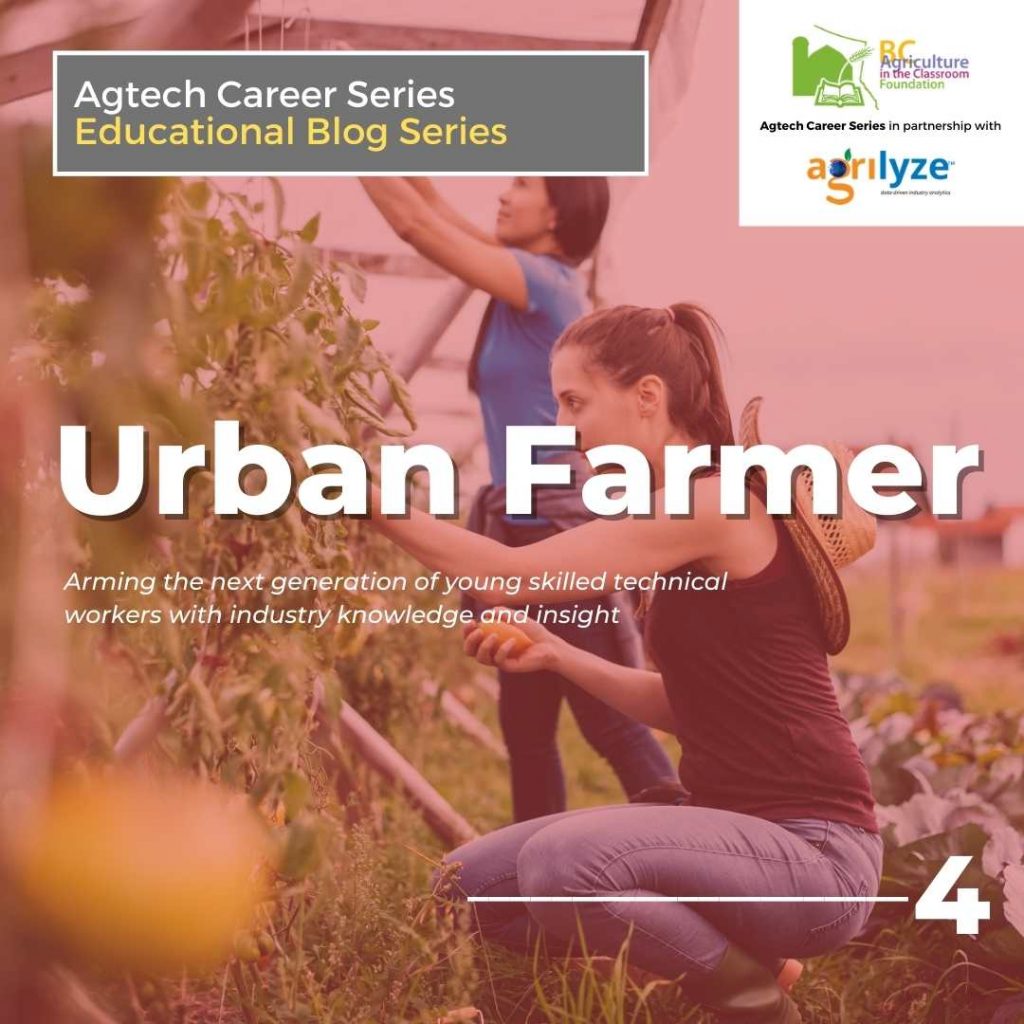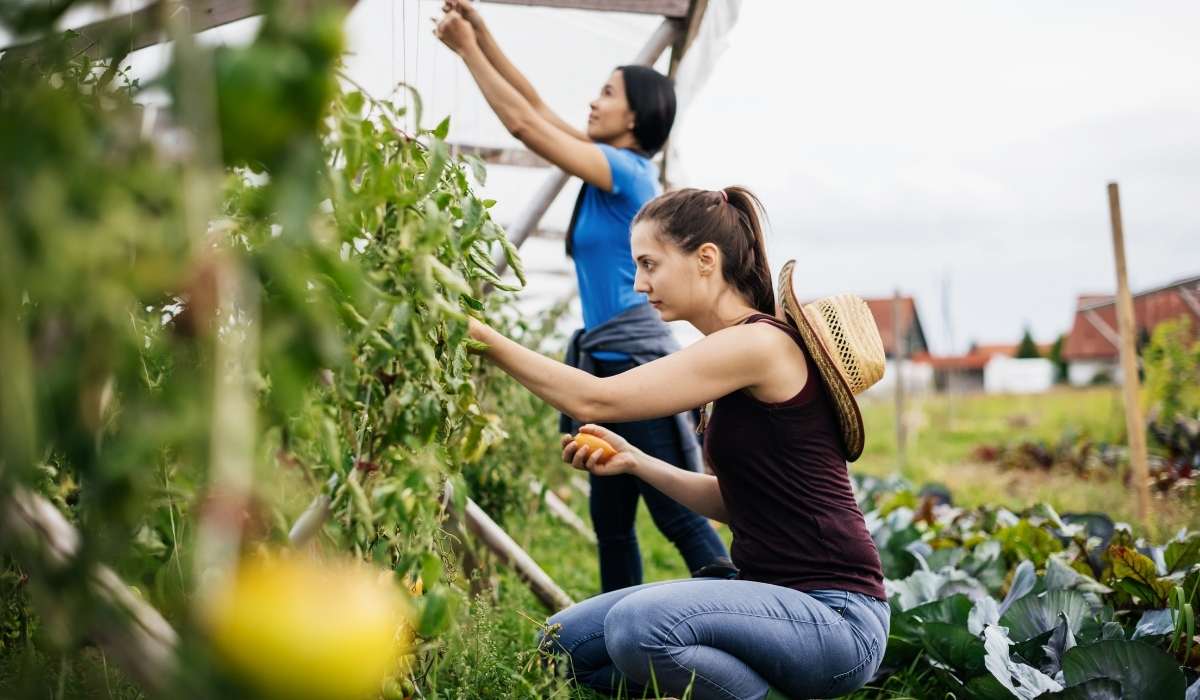Agtech Career Series: Career 4 – Urban Farmer
The definition of a farm is changing. With the implementation of new technologies like robotics, drones, and even gene editing, farmers can embrace innovation and seek better and more modern ways to produce crops. Urban farming is one such innovation that has grown popular over the last 10 to 15 years. With more focus on global challenges like feeding growing communities, space issues and a need to proliferate healthy food, urban farming presents several benefits over conventional agriculture. For example:
- Applying traditional skills in a modern environment
- Using space more efficiently
- Conserving water
- Helping prevent food insecurity
- Reducing greenhouse gas emissions
- Buying food that costs less than a typical supply chain
- Promoting socioeconomic diversity
- Decreasing “food miles”
- Increasing food quality
- Lowering food waste
Overall, urban farms can improve access to healthy, fresh food, helping to mitigate the environmental impact of feeding the world. Urban farms also play an important role in sustainable urban development and can be part of a strategy to reduce hunger and poverty while impacting climate change and adaptation.
The Function of an Urban Farm
Urban farms are built for multiple reasons. One reason is for education; another is for training or re-entry programs. In any case, urban farms are designed to help improve food access or even continue the culinary practices of different cultures! Since food is mainly grown for sale, urban farming can enhance the local food economy by creating environmentally-friendly jobs in food retail, distribution and processing. It can help strengthen skills and shorten food supply chains. A lot of urban farms are non-profit, but some are built for profit. Either way, food justice is an essential component.
What is Food Justice?
Farming is a beautiful activity that reaps many rewards. Farmers are proud of their work and strive to grow the best products to feed people across many different backgrounds. Food justice, then, is an appropriate right where we as people are entitled to grow, sell and eat healthy food. Healthy food is essential because it contributes toward healthier populations – groups of individuals taking advantage of fresh, nutritious, and locally grown food, all with care in mind of the land, the people cultivating and eating the food and the animals.
It isn’t easy to extract ourselves from ‘the power of food’. That is part of the reason why farmers do what they do. Food can and does change the world, and that’s what gives it such unbelievable power. We become a part of food’s role in creating sustenance and connections to our culture, social networks and the earth. It represents family and is part of how we communicate with one another. In essence, it is an extension of love, and for this reason, food justice is critical because, as a practice, it vitally connects us to one another.
Changing the Landscape
While the market for urban farms (according to greenbiz.com) was valued at $2.3 billion in 2018, many look past the practice’s popularity and more in-depth regarding its potential to revolutionize the global food system.
On one side, urban farming is a great way to collect data and learn more about plants. We can understand how they respond to various factors (i.e., environmental stimuli and growing conditions). But on the other side, we need to consider the type of foods that can be produced and pay more attention to staple crops like rice, soy and corn. As these foods make up the bulk of global diets, they also require more energy and space. So, is there a way to grow such foods in an urban farming application? As an urban farmer, this would be a part of your role – to discover practical answers to that very question!
It is crucial to consider the value of an urban crop and apply the lessons of urban farming to improve agriculture as a whole, rather than just an opportunity to produce ‘leafy greens’. Urban farming is one part of the puzzle; we also need to consider sustainability and accessibility for those growing and eating the food.
So, we can start to think in reverse!
Instead of spreading out growing crops across a broader range of territory, we can concentrate our efforts, zoom in and build farm projects in high-rise buildings or structures called vertical farms. This will allow us to reduce energy consumption, and as a result, urban farmers can grow heartier crops and contribute toward feeding local communities.
The Job
As an urban farmer, you need to manage space effectively as you will grow many different crops in a dense area. You require knowledge of solar power, watering systems, and lighting design. It may take years to perfect the craft of urban greenhouse gardening, so you must be dedicated and patient in your job.
You will manage production and distribution for multiple seasons (spring, summer, fall) while maintaining the farm site and infrastructure.
Your primary role is to be highly organized and an efficient operations manager. Sustainable farming practices and attention to detail are a must as you want to run a productive, clean and safe farm. You will work with others such as a Farm Specialist and community volunteers to ensure farm goals are met.
An urban farm looks after the soil, composting systems, chicken coops, hydroponics, aquaponics, rooftop gardens, and greenhouses. You must have extensive knowledge of growing edibles and taking care of animals such as chickens. Day-to-day, you will look after planting, daily upkeep, maintenance and basic repairs.
Core Functions of the Role
If you love working with your hands and cultivating living things, this role is for you! In addition to hands-on work, you will need strong organizational skills and the ability to follow routines. To ensure that crops grow well together, a background in botany, traditional agriculture, horticulture, and engineering will help. Urban farmers range from skilled teachers to those with interests in food and nutrition. As long as you can focus on integrating a farm into a community, you would make a fantastic urban farmer!
- Proficiency in operating, maintaining and repairing farming machinery
- Mastery in handling, maintaining and repairing a well and drip irrigation system
- Ability to drive a UPS-style truck
- Willingness to work according to a flexible schedule based on the needs of the program and farm
- Ability to lift up to 40 lbs and perform strenuous work outdoors
- Capacity to work independently
- Comfortability working in summer heat conditions and the cold winter climate
Skills & Abilities
- Enjoys working in a grassroots, non-profit environment with a diverse group of people
- Enjoys working as part of a small team
- Able to organize, prioritize duties, multi-task, delegate, solve problems all within a fast-paced and continuously changing environment
- Has excellent communication skills (oral and written)
- Has one year or more of farm management experience
- Has two years or more of applied farming skills
- Has one year or more of experience supervising staff and organizing farm work
- Has experience selling produce (via farmers market, retail or other)
Qualifications
- Experience in farm teaching and gardening (with a wide range of students and locations)
- Experience in aquaponics and/or hydroponics
- Has knowledge and passion for urban farming
- Has a positive attitude around others
- Is creative and flexible in finding and implementing solutions should challenges arise on the farm
- Has strength and stamina
- Is not afraid of heights
- Cares for the environment
How Agrilyze Can Help
- Allows sensors and data trackers to store information in a single location allowing for easier analysis
- Enables teams to work together and assign tasks to each other
- Provides the capture of data from mobile devices with the ability to attach documents and photos
- Allows for tracking of the application of nutrients/controls for both optimization of growth and traceability at sale time
- Maps and manages grow space
View Agtech Career 4 – Urban Farmer Info Sheet



